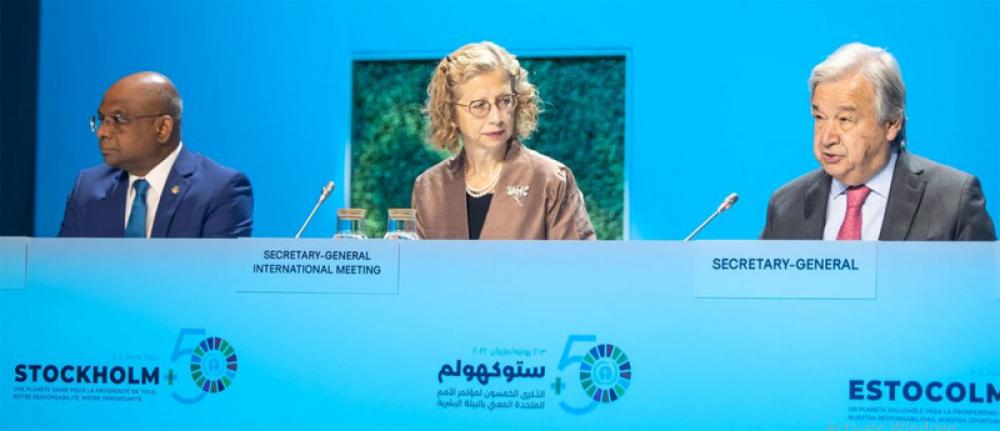Just Earth News | @justearthnews | 03 Jun 2022, 04:36 am Print
 UNEP
UNEP Image: UNEP
New York: Global wellbeing is at risk – and it’s in large part because we haven’t kept our promises on the environment – UN Secretary-General António Guterres said on Thursday.
Although there have been successes in protecting the planet since 1972, including rescuing the ozone layer, Mr. Guterres warned that “Earth’s natural systems cannot keep up with our demands”.
Triple planetary crisis
“Lead us out of this mess”, he urged delegates at the Swedish summit convened by the UN General Assembly, in a call for action against a “triple planetary crisis” that’s been caused by the climate emergency – “that is killing and displacing ever more people each year” – biodiversity loss – which threatens “more than three billion people” – and pollution and waste, “that is costing some nine million lives a year”.
All nations should do more to protect the basic human right to a clean, healthy environment for everyone, Mr. Guterres insisted, focusing in particular on “poor communities, women and girls, indigenous peoples and the generations to come”.
GDP alert
Part of the solution lies in dispensing with Gross Domestic Product (GDP) as a gauge of countries’ economic clout, the Secretary-General continued, describing it as an accounting system “that reward(s) pollution and waste”.
He added: “Let us not forget that when we destroy a forest, we are creating GDP. When we overfish, we are creating GDP. GDP is not a way to measure richness in the present situation in the world.”
After calling on all nations to commit further to implementing the 17 Sustainable Development Goals and following the 2015 Paris Agreement to tackle these threats, the Secretary-General also insisted that greater efforts were needed to bring emissions to net zero by 2050.
Hot air
“Hot air is killing us,” he said, repeating his call to all countries to abandon fossil fuel subsidies and invest in renewable energy, while developed nations should “at least double” their support to poorer countries so that they can adapt to a growing number of climate shocks.
Stressing that nations have already cooperated to protect the planet on many fronts, Mr. Guterres noted that the final touches are expected to be added to a new global biodiversity framework to reverse nature loss by 2030.
Work is also ongoing to establish a treaty to tackle plastics pollution, the UN chief continued, and the 2022 UN Ocean Conference in Lisbon, is expected to galvanize efforts to save our seas.
“If we do these things we can avert climate catastrophe, end a growing humanitarian and inequality crisis and promote inclusive and sustainable development,” he said, adding that “every government, business and individual has a role to play”.
Progress impossible if planet's 'under relentless assault'
Conference convenor, General Assembly President Abdulla Shahid, said there was a simple truth all need to acknowledge: "human progress cannot occur on an earth that is starved of its own resources, marred by pollution, and is under relentless assault from a climate crisis of its own making.
He said recent climate action initiatives such as a plastics pollution treaty push, "give me hope", but they needed to be integrated into a much broader effort.
"We need solutions that address the common bottlenecks affecting the entire environment agenda, which will in turn accelerate the implementation of the 2030 Agenda, and promote resilient and sustainable recovery from the pandemic."
Tech-tonic push for sustainability
In a related development at Stockholm on Thursday, a UN-backed coalition of 1,000 stakeholders from more than 100 countries, launched their bid to use digital tools to accelerate environmentally and socially sustainable development.
The Coalition for Digital Environmental Sustainability (CODES) offers ways to embed sustainability in all aspects of digitalization. This includes building globally inclusive processes to define standards and governance frameworks for digital sustainability, allocating resources and infrastructure, while also identifying opportunities to reduce potential harms or risks from digitalization, said the UN Environment Programme (UNEP).
'A chance for the world to commit': Andersen
Addressing the conference, UNEP chief Inger Andersen, said that 50 years on from the original conference in the Swedish capital devoted to the environment, a plethora of agreements are now in place, “covering every environmental challenge”.
But, the practical results had fallen well short so far, she warned, citing the inequity, injustice, and “distress signals” that abound, from the triple planetary crisis.
“If Indira Gandhi or Olof Palme were here today, what excuses would we offer up for our inadequate action? None that they would accept. They would tell us that further inaction is inexcusable.
“We know, more than ever, the terrible consequences of marching blithely further down the carbon-intensive development path we have gouged from the earth”, she added. “But we also know what we should do. And we know how to do it.
The scientific solutions are clear, “for fair and just transformational changes in our economy, our finance systems, our lifestyles, our governance. And we know need science to swing the needle to action on our moral compass.
“Stockholm+50 is a chance for the world to commit, once and for all, to delivering these transformations”, she told delegates.
- Why are scientists warning about surging glaciers? All details inside
- Mass coral bleaching to hit Great Barrier Reef most years, study reveals
- Global water bankruptcy shock: Why the planet’s most precious resource Is collapsing
- Would you pay $1 million to stay on the moon? This company thinks so
- A historic UN deal is about to transform how the world protects its oceans





-1763561110.jpg)
